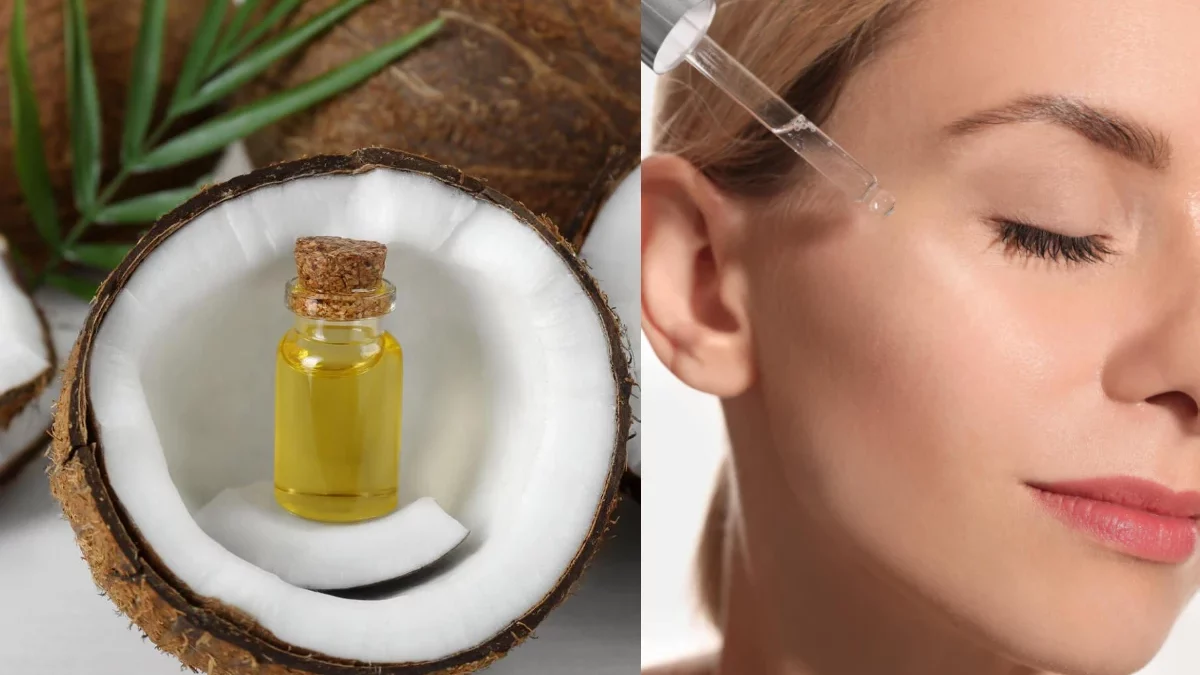Coconut Oil for Face: Looking for a healthier way to healthier skin? The top secret may be hiding in your kitchen: coconut oil. Research has found that coconut oil may remain just what your skin needs. Its benefits include:
- reducing inflammation
- stopping the harm caused by free radicals
- helping to prevent infection
Some blogs, such as OneGreenPlanet, curse coconut oil, advertising its use as a natural moisturizer, especially for your face. Coconut oil remains gentle enough to be used around complex areas like below your eyes and on your lips.
How Do You Routine Coconut Oil On Your Face?
Use coconut oil on your face incredibly like you would use any night cream.
Steps For Using Coconut Oil
- Liquefy one tablespoonful of coconut oil by rubbing it mildly between your hands. The liquefied petroleum will have a silky, light texture.
- Smooth onto your face and neck. You can also routine coconut oil on your chest and other dry areas of your body.
- Gently remove any thick residue with soft tissue. Don’t use cotton balls, as they will pole to the oil on your face.
- Leave a light coat of coconut oil on your skin overnight.
- Avoid receiving coconut oil into your eyes, as it may temporarily blur your vision.
If you remain strained for time, coconut oil can also do dual duty as a makeup remover before using as a night cream. Follow these same steps twice. First, use after gently removing makeup and once to consent a light coating on your skin. Shop for organic coconut oil online.
Some people prefer coconut oil as a chance or once-a-week emollient overnight treatment. If your skin is oily or you take combination skin, you may request to experiment with using coconut oil as a spot treatment for your eyes or on dry skin patches.
What Are The Benefits Of Coconut Oil?
Coconut oil is fat extracted from raw coconuts or dried coconut flakes. Therefore, when used as an overnight moisturizer, its emollient properties may benefit specific skin types, such as dry or normal-to-dry skin. In addition, coconut oil contains nourishing fatty acids that help hydrate and protect the skin.
These include linoleic acid (vitamin F), which assistances skin retain moisture, and lauric acid, which has antibacterial assets. If you have dry, flaky skin, consuming coconut oil as your regular moisturizer may soften and hydrate your skin, leaving it feeling refreshed and soft upon waking.
Are There Any Side Effects?
Consuming coconut oil as an overnight treatment may not be suitable for everyone. Anecdotal evidence remains mixed on coconut oil’s benefits for oily or acne-prone skin. In addition, coconut oil is comedogenic, which can clog pores.
While some individuals find that coconut oil helps pure their breakouts, making skin look brighter and feel softer, others find it too heavy to use as an overnight treatment. Later coconut oil can clog pores; it may donate to acne breakouts in some people.
If you have oily skin, coconut oil capacity causes blackheads, pimples, or whiteheads to form on your face if left on overnight. Also, if you’ve been on long-term antibiotics or have a weakened immune system, you shouldn’t use coconut oil on your face.
Conclusion
Using coconut oil as an immediate moisturizer can benefit people with dry, chafed, or flaky skin. But coconut oil can get pores and isn’t a suitable overnight treatment for some people. On the plus side, it’s relaxed and relatively inexpensive to use. If you’re allergic to coconuts, don’t use coconut oil on your face.

